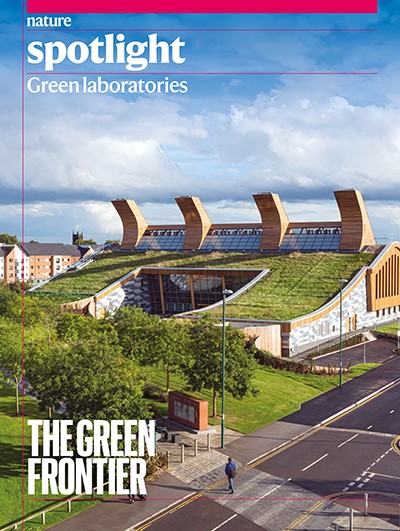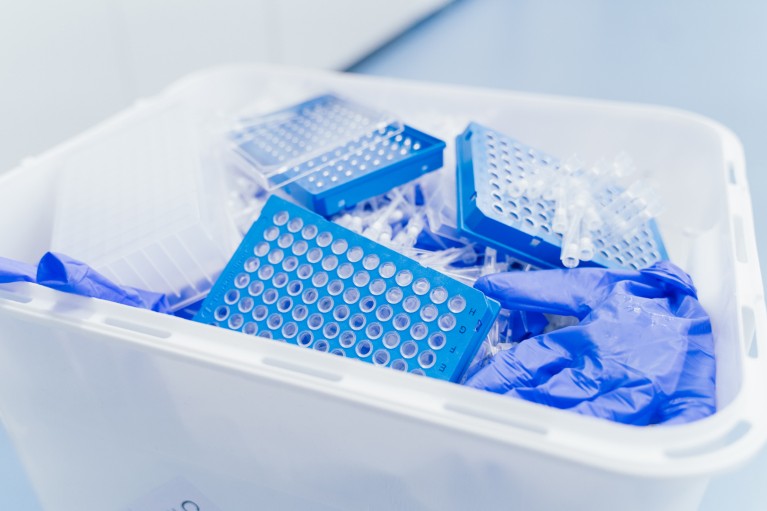
Biology labs generate large amounts of single-use plastic waste, such as pipette tips and trays.Credit: Eplisterra/Getty Images
Single-use plastic has always been a concern of Caitlin Broadbent, a sustainability technician at King’s College London. Each month, researchers in the institute’s Drosophila fly facilities discard more than 20,000 polystyrene vials, contributing to an alarming increase in plastic waste as the laboratories continue to expand.
The disposal of these vials, along with flies and food, involves incineration at high temperatures, which generates substantial carbon emissions. With the environmental impact growing, addressing this issue is an urgent priority for the team.
But times are changing, says Broadbent. Through a project funded by King’s College, her team, along with an undergraduate student working on the project, is developing a business case for switching to glass containers. “While using glass vials was common in the past, implementing this change now requires careful consideration of costs, labour, safety and materials,” Broadbent says.
Nature Spotlight: Green laboratories
If you have worked in a biology lab, you will probably remember the large amount of plastic waste generated every day. This is especially true for plastic products such as pipette tips, Petri dishes and Falcon tubes, which are designed to be used once, or for a short time, before being discarded. A highly cited Correspondence article published in Nature in 2015 estimated that 5.5 million tonnes of plastic waste was being generated yearly by labs worldwide1, on the basis of data collected from the biosciences department at the University of Exeter, UK. That equates to around 2% of the total amount of plastic waste produced globally at that time.
In another study, conducted in 2021 by the Roslin Institute’s microbiology lab at the University of Edinburgh, UK, a team of seven scientists was able to cut its plastic usage by 43 kilograms in a month, saving around 516 kg of waste annually from incineration2. Extrapolating this for the roughly 200 researchers in their institute, the authors estimated that more than 17,000 kg of biohazard waste could be avoided if all labs took up similar plastic-reducing measures. These included adopting reusable metal loops instead of single-use plastic for bacteria inoculation, and reusing plastic tubes after chemically decontaminating them.
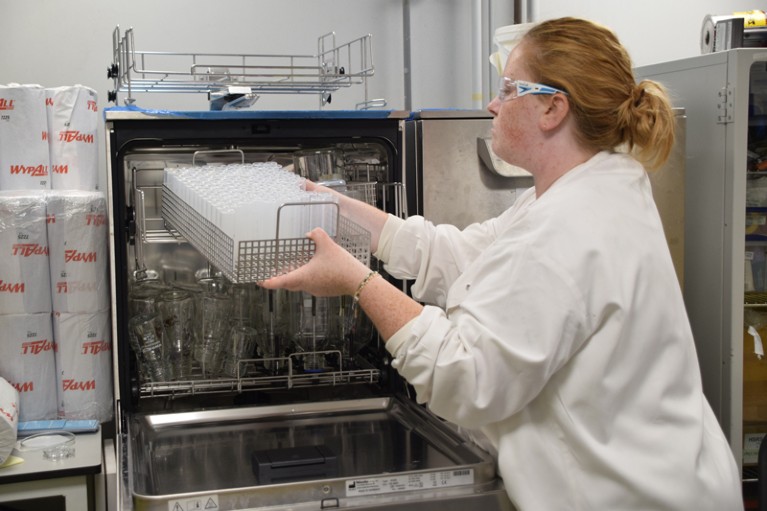
Caitlin Broadbent at work in a Drosophila fly facility at King’s College London. Polystyrene fly vials are placed on a tray and into a laboratory dishwasher. Most will come out clean, but occasionally some need to be run through again.Credit: Caitlin Broadbent
The authors noted that adopting their practices would require considerable operational and behavioural changes, which often acts as a deterrent. For instance, a metal loop used to plate bacteria needs to be heated to ensure biological decontamination, which takes time, and the plastic containers used to store chemicals have to be transported to a specialist facility for cleaning.
Before mass manufacturing of single-use plastics, reusing wooden and metal tools was a common lab practice. Advances in plastic production are enabling scientists to spend less time on cleaning and more on research, but these steps have also created a big plastic-waste problem for society, prompting universities and research institutions to take action.
Money, education and partnerships
Globally, university operators are aware of their plastic addiction and have made various commitments to reduce their reliance on single-use plastic. In the United Kingdom, University College London has pledged that its campus will be free of single-use plastic by the end of 2024, a goal shared by the Australian National University in Canberra. The University of California, Berkeley, has committed to meeting the same target by 2030.
A 2019 master’s thesis investigated the plastic-waste strategies of 76 of the country’s higher-learning institutions. The author found that around 64% of waste-cutting pledges were limited strictly to catering settings, and included banning plastic coffee cups and food containers. Only 6% of the measures aimed to reduce single-use plastic in laboratories. Importantly, for reasons such as labour constraints and costs, most of the universities had not quantified the success of their efforts to reduce plastic waste.
To incentivize a shift away from single-use plastics in research, universities have rolled out funding mechanisms and educational workshops. SustainableLabs, a dedicated team at King’s College London, is helping labs to achieve accreditation in sustainability under an international scheme called the Laboratory Efficiency Assessment Framework, or LEAF. “One success story we had was how a PhD student led a lab to replace single-use non-recyclable plastic well-plates with reusable ceramic well-plates for brain-section immunohistochemistry staining,” says Broadbent.
“At our Drug Control Centre, where strict protocols prevent cross-contamination in drug testing, we have also implemented a sustainable approach by reusing glass test tubes, plastic centrifuge tubes and plastic scintillation vials. By utilizing a dishwasher and standardized cleaning practices, we significantly reduce plastic waste while maintaining the high standards required for our research.”
Some institutions, including the University of the West of England Bristol (UWE Bristol), have also partnered with firms to recycle plastic waste generated from labs. “It is not easy to identify companies that specialize in recycling plastic waste from labs,” says Joanna Dainton, head of circular economy and responsible consumption at the university. “When we first decided to partner with RecycleLab, a start-up specializing in recycling non-hazardous plastic waste such as plastic that has not been in contact with biological materials like blood and cells from labs, we wanted to test the market to understand what they could offer.”
Ultimately, says Dainton, the trial data showed that the programme worked well, and, as a result, UWE Bristol has formalized a partnership between its College of Health, Science & Society and RecycleLab, which is based in Chipping Norton, UK. “Through this partnership, we expect to recycle over 600 kg of plastic waste, which is approximately 10% of the plastic waste generated by the college each year.
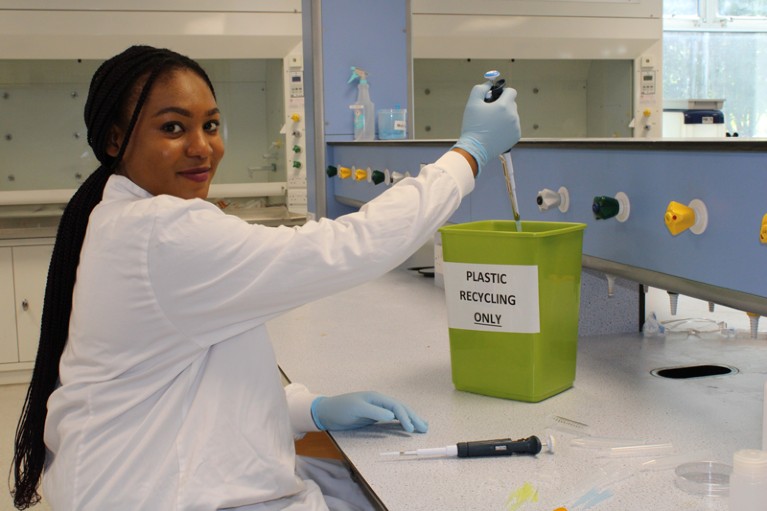
A student in Joanna Dainton’s team at the University of the West of England Bristol, UK, demonstrates the lab’s plastic-recycling project.Credit: Marcus Olivant
“The challenge right now, to get more organizations to consider recycling their plastic waste, will be scale and price,” says Dainton. “At the moment, RecycleLab is not as cheap as large multinational recycling companies, partly because they do not yet have the customer base, but there is real potential here as lab plastics are a global issue across teaching institutions and hospitals.”
In a report produced in 2022, the UK Royal Society of Chemistry recommended practices to help institutions cut back on single-use plastic. Besides incentivizing initiatives and attitudes that work in favour of sustainable research and educational workshops, these practices support the creation of roles dedicated to lab environmental-sustainability programmes. They also encourage the use of digital technologies to record, quantify and share sustainability-related experimental design and outcomes.
Trials and tribulations
These changes don’t come without challenges. Mark Fretz, an architecture and built-environment specialist at the University of Oregon in Eugene, notes that in his research, which involves collecting air, water and surface microbiomes, it is hard to eliminate single-use plastic altogether. To avoid cross-contaminating samples, he and his team rely on copious amounts of sterile collection equipment during their fieldwork, including individually packaged, plastic microcentrifuge tubes and polystyrene Petri dishes.
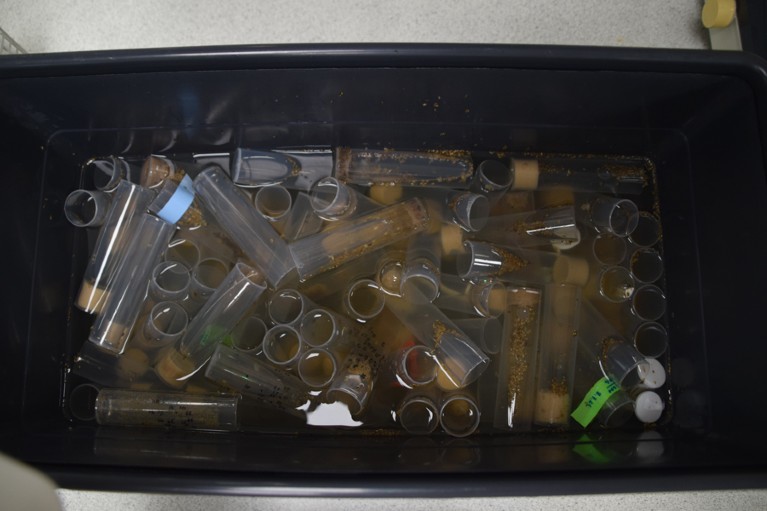
Fly vials that have had their plugs removed are soaked in hot water and ChemGene disinfectant for two hours. This loosens the fly food and dead flies.Credit: Caitlin Broadbent
“Back in the lab, after sample collection, most of the reagents for DNA/RNA extraction and library preparation are also packaged in plastic,” Fretz says. “We could substitute some of the plastic with glassware; but it comes with challenges for lab safety as glass is more likely to break accidentally and create a hazardous spill.”
Fretz says that although the team has tried using glass and stainless steel in place of plastics in active-air and surface-microcosm studies, each collection can have upwards of 500–1,000 samples, which means that substantial time and space is needed for cleaning and sterilizing. “We don’t have the staff, lab space or budget for projects to take on this additional workload, so plastic single-use consumables have become the de facto solution,” he says.
A reason for optimism
In its 2022 report, the Royal Society of Chemistry found that 79% of the researchers surveyed knew that their lab activities affected the environment, and 84% wanted to reduce the adverse environmental impact of their work. Another 63% said that they had made changes in the previous two years to reduce that impact, or that of their research groups or departments.
A similar sentiment emerged at the University of Manchester, UK, where a scheme has saved more than 24,000 pieces of plastic each academic year by reducing plastic use in lab practical classes. Surveys conducted after the classes found that 97% of the nearly 400 respondents were pleased to be part of a scheme that was working to reduce single-use plastic in practical sessions.
Dainton says that the success of initiatives to reduce plastic use has a lot to do with changing mindsets. “We have started educating undergraduates on what types of plastics can be recycled, hoping that early awareness will make them conscious of their choice of research materials in the future.” Furthermore, “the wide variety of plastics used in labs makes the recycling process complicated, so clear communication is important to prevent contamination of recycling”.
Broadbent says researchers often tell her that they want to change their plastic-consumption habits but don’t know how or lack the resources, or that “they have some colleagues who are not on board”. This is why it is important for universities to have funding mechanisms to support a change in behaviours. Such mechanisms could include money to upgrade lab equipment for glassware washing, and workshops to change mindsets and debunk myths, such as that using washable glassware carries a high risk of contamination.
“There’s still a long way to go, but there is reason for hope,” says Broadbent.

